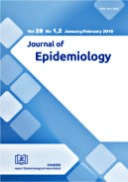
JOURNAL OF EPIDEMIOLOGY
Scope & Guideline
Empowering the epidemiology community with knowledge.
Introduction
Aims and Scopes
- Population Health Dynamics:
The journal emphasizes studies that explore the health dynamics of populations, including how social, environmental, and biological factors contribute to health disparities. - Methodological Innovations:
A consistent focus on innovative methodological approaches, including causal inference, machine learning, and advanced statistical techniques, is evident in the journal's publications. - Risk Factors and Disease Associations:
Research articles frequently investigate the relationships between risk factors (such as lifestyle, environmental exposures, and socioeconomic status) and various diseases, aiming to inform prevention strategies. - Public Health Policy and Practice:
The journal also addresses the implications of epidemiological findings for public health policy and practice, providing insights that can guide health interventions. - Mental Health Epidemiology:
There is a noticeable focus on mental health issues, including studies on the epidemiology of mental health disorders and their associations with various social determinants.
Trending and Emerging
- Impact of COVID-19:
A significant increase in studies examining the epidemiological aspects of COVID-19, including vaccine effectiveness, mental health implications, and socioeconomic impacts, showcases the journal's timely response to the pandemic. - Social Determinants of Health:
There is a rising trend in research focused on social determinants of health, highlighting how factors like race, socioeconomic status, and environment influence health outcomes. - Causal Inference Techniques:
Emerging methodologies in causal inference, such as targeted maximum likelihood estimation and machine learning applications, are increasingly featured, reflecting a shift towards more rigorous analytical frameworks. - Health Disparities and Equity:
Research addressing health disparities, particularly among marginalized populations, is gaining momentum, emphasizing the need for equity in health outcomes. - Longitudinal and Life-Course Studies:
An upward trend in longitudinal studies that assess health trajectories over time is evident, focusing on the cumulative impact of exposures throughout the life course.
Declining or Waning
- Traditional Epidemiological Studies:
There is a decreasing emphasis on classic observational studies, such as cohort and case-control designs, as newer methodologies gain traction. - Single Disease Focus:
Research focusing on single diseases or conditions is becoming less frequent, with a shift towards examining multi-morbidity and the interplay between various health issues. - Descriptive Epidemiology:
The journal's publications indicate a decline in purely descriptive epidemiological studies, as more emphasis is placed on causal inference and intervention studies. - Environmental Epidemiology:
While still relevant, studies specifically addressing environmental epidemiology have seen a reduction, possibly due to a growing focus on integrated approaches that combine multiple determinants of health.
Similar Journals
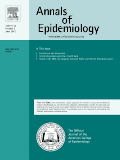
ANNALS OF EPIDEMIOLOGY
Leading the Conversation in Epidemiological StudiesANNALS OF EPIDEMIOLOGY, published by Elsevier Science Inc, stands as a leading journal in the field of epidemiology, with an impressive impact factor that reflects its significant contribution to public health research. With an ISSN of 1047-2797 and an E-ISSN of 1873-2585, the journal has been at the forefront of disseminating high-quality, peer-reviewed research since its inception in 1990. It is consistently ranked in the first quartile (Q1) for epidemiology in 2023, occupying the 29th position out of 148 in the Scopus Medicine category, with a percentage ranking in the 80th percentile. The journal aims to provide a comprehensive platform for the interdisciplinary exchange of pioneering epidemiological studies, exploring diverse health issues and their societal impacts. Researchers, professionals, and students alike will find valuable insights and innovative methodologies within its pages, making it an essential resource for anyone engaged in the study and application of epidemiology. Its headquarters located in the United States (STE 800, 230 Park Ave, New York, NY 10169) further reinforces its influence in the academic community.

Indian Journal of Public Health
Advancing public health knowledge for a healthier tomorrow.Indian Journal of Public Health, published by Wolters Kluwer Medknow Publications, serves as a pivotal resource in the fields of public health, epidemiology, and health policy. With a history spanning over six decades, since its inception in 1961, this esteemed journal offers significant insights into various health-related issues affecting the Indian population and beyond. As an Open Access journal since 2010, it ensures that crucial research findings are accessible to a global audience, promoting collaboration and knowledge sharing among researchers, professionals, and students. The journal currently holds a respectable status with a 2023 ranking in the Q3 category in epidemiology, health policy, medicine (miscellaneous), and public health, environmental and occupational health, placing it among the noteworthy publications in its field. With impressive Scopus rankings and an aim to drive public health discourse, the Indian Journal of Public Health is an essential platform for those dedicated to advancing public health practices and policies.

Journal of Research in Health Sciences
Fostering collaboration for a healthier world.Journal of Research in Health Sciences, published by Hamedan University of Medical Sciences, is a prominent international journal that has been disseminating research findings in the fields of public health, epidemiology, and health policy since its inception in 2009. With an ISSN of 2228-7795 and E-ISSN 2228-7809, the journal has established a solid reputation, currently ranked in the third quartile (Q3) across several categories related to health, as noted by Scopus. The journal serves as a vital resource for researchers, professionals, and students, offering rich insights into the complex interactions within health sciences and facilitating the dissemination of innovative research that addresses pressing health challenges. The journal's reach extends beyond Iran, contributing to global discourse and promoting evidence-based practices in health. By providing an open-access platform, it ensures that vital information is readily accessible to the academic community and beyond, fostering a collaborative environment for advancing health sciences research.
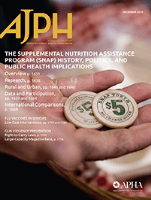
AMERICAN JOURNAL OF PUBLIC HEALTH
Elevating public health discourse with impactful studies.The American Journal of Public Health, published by the American Public Health Association, stands as a cornerstone in the field of public health and epidemiology since its inception in 1949. With its rigorous peer-review process and a robust commitment to advancing knowledge and research practices, this journal holds a prestigious position in the academic community, as reflected in its 2023 Scopus ranking, where it is placed in the top percentile (93rd) within the categories of Public Health and Environmental and Occupational Health. The journal's focus encompasses a broad spectrum of public health topics, making it essential reading for researchers, practitioners, and students dedicated to improving population health. Subscribers can access invaluable insights through its collection of innovative studies and reviews, thereby reinforcing the journal's role in shaping public health policy and practice. By bridging research and real-world application, the American Journal of Public Health remains a vital resource for those engaged in the quest to improve health outcomes across diverse communities.
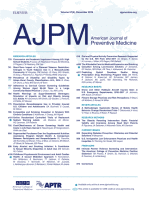
AMERICAN JOURNAL OF PREVENTIVE MEDICINE
Exploring innovative strategies for effective disease prevention.AMERICAN JOURNAL OF PREVENTIVE MEDICINE is a premier publication in the fields of Epidemiology and Public Health, published by Elsevier Science Inc. With a commendable impact factor and ranking within the top quartile for both Epidemiology and Public Health categories, this journal serves as a vital source of cutting-edge research, reviews, and critical insights aimed at promoting health and preventing disease. Since its inception in 1985, the journal has been dedicated to disseminating high-quality articles that inform health policy, improve clinical practices, and enhance community health initiatives. It is readily available to researchers and professionals committed to advancing their knowledge and practice, ensuring the continued evolution of preventive medicine. The journal's reach and influence, underscored by its impressive rankings, position it as an essential resource for those looking to make a meaningful impact in the world of preventive health.
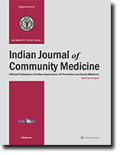
Indian Journal of Community Medicine
Transforming Community Health Through Collaborative KnowledgeIndian Journal of Community Medicine, with its ISSN 0970-0218 and E-ISSN 1998-3581, operates under the esteemed Wolters Kluwer Medknow Publications. This peer-reviewed, open access journal, established in 2005, has been at the forefront of disseminating research in the fields of public health, community medicine, and environmental health, forging connections among researchers, practitioners, and policymakers in India and beyond. With a notable impact factor and a Q3 ranking in Public Health, Environmental and Occupational Health for 2023, this journal maintains a commitment to improving community health through empirical research, policy analysis, and best practice sharing. The journal is pivotal not only in addressing prevalent health issues but also in fostering innovative solutions tailored to the unique challenges faced by diverse communities. With publication convergence from 2009 to 2024, the Indian Journal of Community Medicine continues to serve as a vital resource for academics, professionals, and students looking to contribute to and engage with the evolving landscape of community health research.
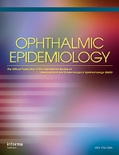
OPHTHALMIC EPIDEMIOLOGY
Bridging Knowledge and Practice in OphthalmologyOphthalmic Epidemiology, published by Taylor & Francis Inc, stands as a crucial platform in the fields of ophthalmology and epidemiology, with the journal's pivotal contributions recognized in its esteemed category quartiles, ranking Q1 in Ophthalmology and Q2 in Epidemiology for 2023. Since its inception in 1994, the journal has provided a multidisciplinary approach to understanding the distribution and determinants of ocular diseases, thereby informing public health practices and clinical interventions. With a commitment to disseminating high-impact research, it holds a Scopus rank of #45/137 in Ophthalmology and engages a global audience of researchers, practitioners, and students dedicated to advancing the field. Although it is not an open-access journal, Ophthalmic Epidemiology remains a vital resource for innovative studies and reviews that help shape evidence-based strategies to combat vision-related public health issues.
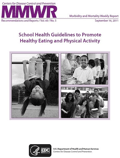
MMWR-MORBIDITY AND MORTALITY WEEKLY REPORT
Fostering Awareness and Safety in Public HealthMMWR-Morbidity and Mortality Weekly Report, published by the Centers for Disease Control and Prevention (CDC), stands as a preeminent journal in the fields of epidemiology, health information management, and public health. With an impressive reputation bolstered by an H-index reflecting its influence, MMWR is recognized as a Q1 journal as of 2023 across multiple health-related categories. Given its ranking in the 99th percentile among its peers, it provides critical insights and reports that shape health policy and practice globally. The journal is accessed freely by the research community, ensuring that key findings related to morbidity and mortality are widely disseminated and utilized. Established in 1981 and continuing through to 2024, MMWR remains an essential resource for researchers, health professionals, and students dedicated to understanding and combating health issues in the United States and beyond. Its ongoing contributions to the public health dialogue illustrate the journal's pivotal role in promoting health awareness and safety.

Lancet Regional Health-Europe
Transforming Health Systems Through Innovative ResearchThe Lancet Regional Health-Europe is a prestigious academic journal published by Elsevier, dedicated to advancing research in the fields of Health Policy, Internal Medicine, and Oncology. As part of a reputable series that focuses on regional health issues, it aims to publish high-quality, peer-reviewed articles that contribute to the understanding and improvement of health systems across Europe. With an impressive impact factor reflected in its Q1 quartile rankings for 2023—ranking #2 in Health Policy, #8 in Internal Medicine, and #22 in Oncology—it is recognized for its significant contribution to cutting-edge research. The journal offers open access options, ensuring that findings are widely disseminated and accessible to researchers, healthcare professionals, and policy-makers alike. By fostering collaboration and interdisciplinary discourse, The Lancet Regional Health-Europe serves as an essential platform for innovative solutions and strategies in health care that address the unique challenges faced within the European context, making it an invaluable resource for academics and practitioners dedicated to public health advancement.
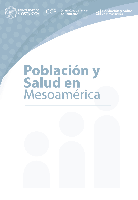
Poblacion y Salud en Mesoamerica
Advancing Knowledge in Mesoamerican Health DynamicsPoblacion y Salud en Mesoamerica is a pivotal open-access journal published by the University of Costa Rica's Centro Centroamericano Poblacion. With an ISSN of 1659-0201 and an E-ISSN of the same, this journal has been dedicated since 2003 to advancing the fields of demography, epidemiology, health informatics, and public health within the Mesoamerican region. Addressing critical health and population issues, it aims to foster a deeper understanding of demographic trends and their implications on health policies. As of 2023, the journal ranks in the Q4 quartile across several categories, reflecting its commitment to publishing quality research while serving as a platform for emerging scholars and seasoned professionals alike. Although it is currently in the lower quartile ranks, the journal seeks to establish itself as a vital resource in the context of Mesoamerican social sciences and health, making it an essential tool for researchers and practitioners interested in regional population health dynamics. Its editorial board is comprised of experts dedicated to enhancing the scholarly conversation surrounding population health and policy in Central America.